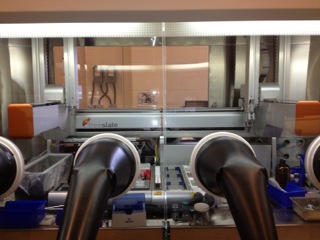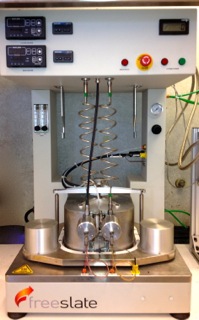Catalyst Development and Discovery Labratory
The Catalyst Discovery and Development Center (CDDL) was established in 2010. It has state of the art robotics equipment for the high throughput synthesis, screening and optimization of new catalysts and automated polymer analysis. Other applications such as optimization of reaction conditions, kinetic studies, formulation testing and solubility studies may also be performed. The CDDL is available for use by Coates group members and collaborators. Please contact Dr. Anne LaPointe for more information.
.
Freeslate Core Module 3 (CM3)
Equipment
Freeslate Core Module 3 (CM3)
- Inert atmosphere
- Solid addition
- Liquid addition (syringe and PDT)
- Stirring and vortexing
- Heating and cooling (-20 °C-180 °C)
- On-deck pressure reactors
- Gravimetric analysis
- Speedvac vacuum centrifuge
Freeslate SPR
Freeslate SPR
- Pressurized high throughput batch reactor
- Rated to 1000 psi and 400 °C
- Automated control of temperature, mixing, and gas flows
Agilent Infinity 1260 RT-GPC with autosampler (THF, 30 °C)
Agilent Infinity II HT-GPC with autosampler (TCB, 150 °C)
Mettler DSC
Agilent GC
Carver press
Shimadzu AGS-X tensile tester
Screening Examples
Epoxide/CO2 Copolymerizations
Epoxide/Anhydride Copolymerizations
Isospecific Epoxide Polymerization
Olefin Polymerization
Ring-Opening Metathesis Polymerization
Hydrogenation
Solubility Studies
Kinetics Studies
Optimization of Reaction Conditions and Cocatalysts
Carbonylation of Epoxides
Workflows
Traditional catalyst synthesis, screening and characterization workflows can be scaled down and performed in a fully automated fashion, allowing the user to screen a large number of systems in a fraction of the time required to do so using traditional techniques. In some cases, modifications will be necessary to adapt the workflow to a small scale or to facilitate automated synthesis, screening and characterization. For instance, metal-ligand combinations may be combined in situ rather than use isolated complexes, or rapid qualitative analysis methods such as TLC will be used in cases where the hit rate is expected to be low. A typical workflow will include design of experiment using Library Studio and operation of the CM3 and SPR is using Automation Studio. Dr. LaPointe assists with experiment and workflow design and trains users how to use the CM3, SPR, and associated equipment and software.
Contact Information
Anne M. LaPointe, Ph.D.
560 S.T. Olin
Department of Chemistry and Chemical Biology
Baker Laboratory
Cornell University
Ithaca, NY 14853-1301
Telephone: (607) 255-5401
Email: lapointe@cornell.edu
Shipping Address
Department of Chemistry and Chemical Biology
G-075 Chemistry Research Wing
162 Sciences Drive
Cornell University
Ithaca, NY 14853-1301



